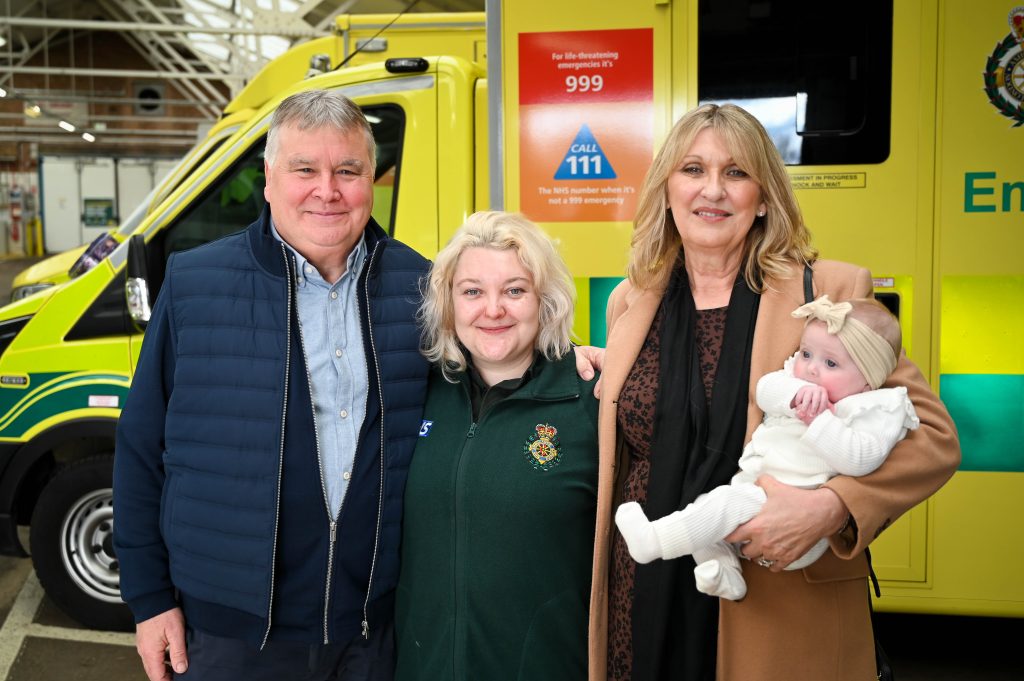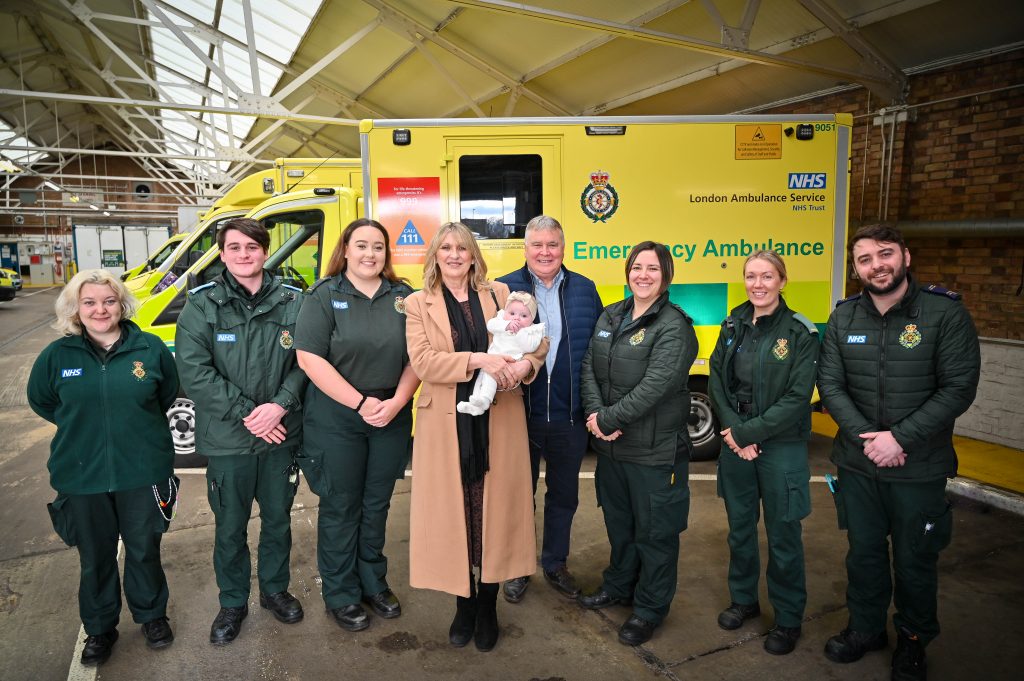Critically ill grandmother thanks medics for ‘gift of life’ and chance to meet her first granddaughter
A woman who survived a cardiac arrest has thanked paramedics for giving her the chance to meet the granddaughter born as she fought for her life.

At an emotional reunion at Isleworth Ambulance Station, Sue Whitham, 62, who lives in Hanworth in west London, thanked the ambulance crews and 999 call handler who came to her rescue when she suffered a sudden cardiac arrest at home.
Sue left work one night at St Mary’s University in Twickenham telling colleagues ‘I think my granddaughter will be born this weekend’. She promised to call with news, but that night her heart suddenly stopped beating.
She said: “Thankfully my husband Julian knew how to do chest compressions and instinctively knew that I wasn’t breathing. Within seconds he saw I was turning blue.
“Fortunately we had our phones nearby so my son Jordan and his partner Emma could call as we were expecting their daughter Sienna to be born at any moment and we were on standby to look after their little boys.”
Julian dialled 999 and call handler Mattie Wright was there for him on the other end of the line to offer life-saving advice. She counted with him so he could perform chest compressions on Sue.
Julian said: “Within seconds I knew Sue was gone and I could tell there was no sign of life. Mattie was brilliant and her calming voice encouraged me to keep going with chest compressions.”
Isleworth, Hanwell and New Malden ambulance crews including Jade Bank, Jack Denham, George Simpson, Annie Davies and Nichaela Coyle arrived at the scene quickly. Advanced paramedic Andy Parker was also dispatched to assist in stabilising Sue.

Julian added: “The crews took over resuscitation and a couple of them took me into another room and kept me away so I couldn’t see what was going on. I was in a terrible state of shock.”
It took an hour to stabilise Sue before ambulance crew George and Annie took her to St George’s Hospital in Tooting.
Sue suffered another cardiac arrest on her way to St George’s and was immediately taken to the hospital’s heart centre. She had tiny tubes, called stents, inserted into the blood vessels around her heart to allow the blood to keep flowing through.
Doctors on the intensive care unit put Sue into a medically-induced coma for several weeks so they could drop her body temperature down to allow her recover.
Sue said: “When I was brought out of the coma I didn’t know what had happened to me and couldn’t believe I had a four-week-old granddaughter.
“I didn’t even know Sienna had been born as I thought I had woken up the next day. It’s an absolute miracle that I’m here. I’ve been told my heart failed several times and I’m so grateful the ambulance crews didn’t give up on me.
“I was determined to get strong again so I could walk Sienna in the park and shop for baby things, which four months on, I can now do. The hospital medics at St George’s were also incredible.”
Sue, who already has four little grandsons she adores, added: “I’ve been gifted another life. I had longed for a granddaughter and when we found out about her I was just so excited for a little girl.”
Mattie Wright, 999 Emergency Call Handler at London Ambulance Service, said: “I was utterly overjoyed to hear of Sue’s incredible recovery, and it was an honour to meet Sue and her family. I definitely cried when I met them.
“I hope Sue, Julian and their newly expanded family enjoy every single moment they can squeeze from life.”
Julian said: “It was wonderful to meet Mattie and the paramedics who helped saved Sue. As a family, we are eternally grateful to them.”
Sam Wilcox, Community Defibrillation Manager at London Ambulance Service, said “Knowing what to do when someone is in cardiac arrest and having the confidence to act quickly will save lives.
“The first few minutes before an ambulance arrives can make all the difference. Over 75 percent of cardiac arrests happen at home, so by learning these simple skills, you could save someone you love.”
Dr Jonathan Aron, Consultant in Intensive Care Medicine at St George’s Hospital, said: “It’s wonderful to hear that Sue has continued to do so well since leaving our care, and it was a privilege to have played such a vital part in her treatment and recovery.
“Patients who have suffered heart attacks and acute heart failure like Sue need immediate attention. This was an incredible response from everyone – from Sue’s family, to the call handler and paramedics, to the multiple teams of staff at St George’s and beyond.”
London Ambulance Service is aiming to make London a city of lifesavers and it only takes a few minutes to learn the simple steps to take when someone is in cardiac arrest. Help us to help Londoners by becoming a London Lifesaver today.

Follow us on social media: